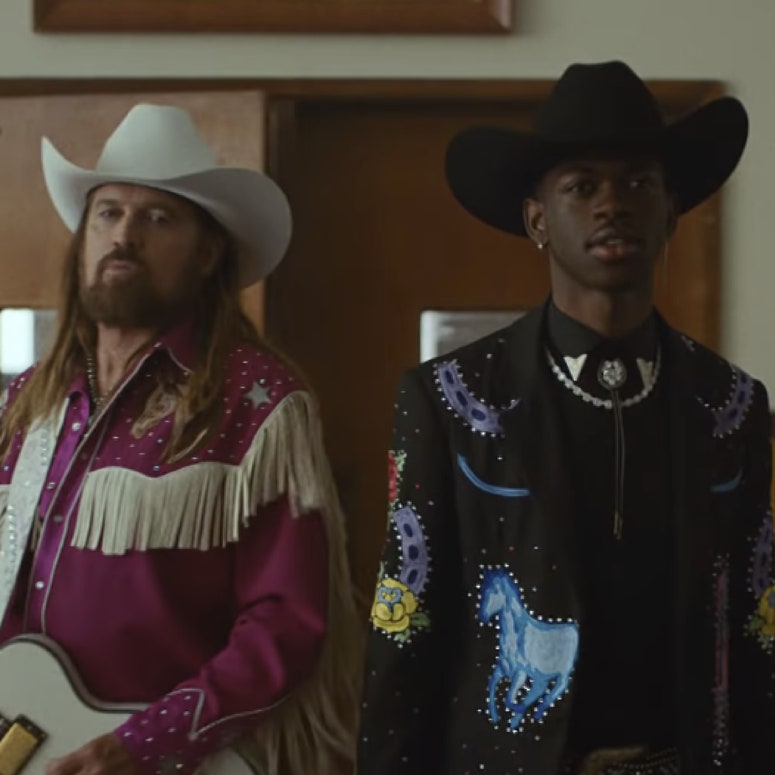It’s 1am in Dalston, East London, and the entire club has just lost their shit. No, the DJ didn’t drop “Murder on the Dancefloor” or a techno remix of The White Lotus theme tune. It was Beyoncé’s “Texas Hold ‘Em” that did it – a soft, guitar-pluckin’ country pop song with lyrics like “Rugged whiskey, 'cause we survivin' / Off red cup kisses, sweet redemption, passin' time, yeah.” Now, the dancefloor is rammed: drinks spilling everywhere, British gays square dancing into each other. Indeed, despite the fact that most of us have never seen even a smudge of a tornado in our small towns (read: the streets surrounding our nearest tube stop), the Beyoncé song has unexpectedly gained the megastar her first UK number one in 14 years. But why now? What gives?
American country music has always had a hard time breaking through to the UK mainstream. Culturally, the genre doesn’t totally make sense here (the only ‘open road’ we have is the A1, and our ‘cowboys’ are farmers in wellies and zipped up fleeces). There have been a few big crossovers over the years – Johnny Cash, Dolly Parton, Shania Twain’s “Man, I Feel Like a Women” etc. But generally, listening to American country music here is a bit like Americans listening to Robbie Williams or Grime – it can be appreciated, beloved even, but there’s an ever so slight lack of cultural understanding that makes it difficult for the genre to truly flourish in the way it does in its country of origin (consider the fact that 42 percent of Americans listen to country music, second only to rock music, which comes in at 45 percent).
In recent years, however, there’s been a noticeable shift. It arguably began in 2019 with Lil Nas X’s “Old Town Road”, a trap-country hybrid that had conservatives up in arms and the rest of the world slut-dropping to a song about horses and cowboy hats. “Old Town Road” was UK number one for two weeks, with the Atlanta star packing out Glastonbury’s Pyramid stage last year (the clearest sign that an artist has made it in the UK). Now, not only has “Texas Hold ‘Em” remained in the top spot for five consecutive weeks, but Shania Twain, the proclaimed “Queen of Country Pop” is playing Glastonbury’s coveted legends slot this summer. Later this year, Lana Del Rey will release a country album, Lasso, a surefire indicator that such a move is no longer considered risky for a global pop star at the top of her game (lest we forget that Lana has had just as many UK number one albums as Arctic Monkeys, Radiohead and Blur). Meanwhile, we have UK artists like Sam Fender releasing collabs with US acts like Noah Kahan – folk music, sure, but also what could be more country than strumming an acoustic guitar while singing about being “Homesick”?
You could argue this is part of a wider evolution that has taken place in the music industry over the past two decades. Streamers like Spotify, Apple Music and YouTube are steadily globalising music across the board, with artists no longer relying on physical sales or local radio plays. Consider the international dominance of K-pop, for example, and the fact that SEVENTEEN are also playing Glastonbury this year (a first). Or look towards Spanish language acts like Rosalía who've catapulted themselves to a global stage. It makes sense that country music would break through now, at a time in which international genres are breaking through everywhere.
UK drag queen and country singer Amiss Tori thinks that we're embracing country music more over here as the genre untangles itself from the ultra-conservative roots that it's traditionally been associated with. “Country music has in the past been seen as ‘music by old white men’ but it’s more broad and diverse than that. Even the old white men aren’t all as conservative as you might expect, just check out Willie Nelson’s latest release ‘The Border’,” she says, pointing to a song expressing sympathy for those crossing the US / Mexican border. “In the last few years, we’ve seen so many more culturally and ethnically diverse artists break through in country music, like Mickey Guyton and Kane Brown. You’ve also got LGBTQ+ country artists like Orville Peck, Trixie Mattel and Brooke Eden hugely gaining in popularity.”
As the 2024 headliners are revealed, the world's most successful pop star seems to be snubbing the world's most prestigious music festival

Others I spoke to name-checked the mammoth global impact of Taylor Swift, an artist who first emerged as a country pop act. Though she’s more of a straight-up pop artist now, there’s no escaping those country roots. Crowds at her shows regularly resemble a sea of cowboy hats, cowboy boots and fringing – even over here in the UK. Considering the fact it’s widely believed that Swift has the power to swing a political vote, it’s no stretch to wonder whether she’s influencing the genres we consume too (anyone who’s rinsed 1989 to high heaven will surely have given her self-titled country debut a spin at some point also).
All of that said, we're still yet to embrace American country music in quite the way America does – and we probably never will. The country that does well here – Beyoncé obviously, but also acts like Kacey Musgraves and Luke Combs – tends to lean poppier and more accessible. “Texas Hold ‘Em” is a country song, yes, but it's also just a catchy, foot-tapping pop track. Major American country acts – the Kenny Chesneys and Garth Brooks of this world – are so divorced from UK culture, it'd be like trying to get US audiences into footie chants or Tesco meal deals
Still, now that I've seen an East London queer club sing-scream the words “It's a real-life boogie and a real-life hoedown,” truly anything is possible.


